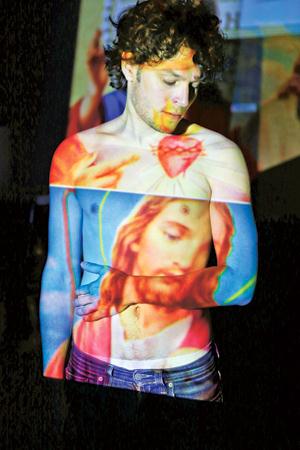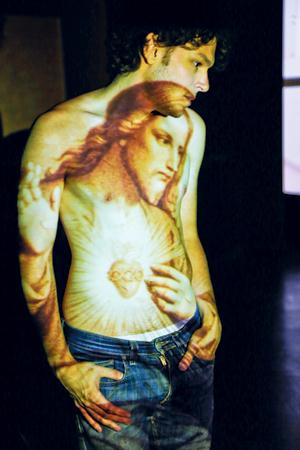
Andrew Kushnir Credit: Kyle Burton
Andrew Kushnir is going to get crucified for this one. As part of the cast of Sarah Ruhl’s Passion Play, Kushnir will play three different characters, all of whom themselves play Jesus Christ in Passion plays in different time periods. But Ruhl’s piece, which features gay Nazis and a Ronald Reagan cameo, is no Easter pageant.
Xtra: So, three time periods?
Andrew Kushnir: The first in Elizabethan England, the second in Nazi Germany, the third in late-1960s South Dakota into the mid-1980s.
But the characters in each act are different?
They are. I mean, there are lots of echoes. In the first play, my character, John, is the most romantically unaffiliated in the community, whereas in the second piece, Eric is wrestling with his desire for a soldier, and in the third piece, Jay really falls in love with the craft around theatre. It’s a really sexy and also super-smart, well-observed dialogue about people and how we deal with the mess of feeling.
How is it sexy?
So many of the characters are trying to either tame or control a kind of animal inside them. A kind of . . . ferocious.
A “passion,” if you will?
A passion. There’s a real hunger and a real ache in a lot of the characters. And the play asks, Is religion there to help us? Is that system to help us deal with that lack of control? Or is that animal thing the divine? Is the actual sex, the desire – is that more godly? I was thinking about “What is the queer interpretation of the piece?” and there’s a lot of – regardless of whether it’s same-sex desire or people just dealing with loving the wrong person – there’s a lot of closeting.
What’s it like to be Jesus?
I went to an all-boy Jesuit high school growing up. I was born into the Ukrainian-Canadian Catholic community, so I’m used to Jesus being around, even though I’m not really a practising anything right now. And what I’ve been really excited about is that Jesus was really a lot about theatre. When you look at the Bible, Jesus was telling stories to groups of people in order to help them with their lives. I think he was dealing in metaphor, and theatre is about communicating metaphor to an audience.
So, you like him as a theatre artist?
He’s got his show-stopping moments! It’s good theatre. It’s this guy challenging the system. He’s a revolutionary. The powers that be panic. They put him to death. He’s given the chance to get away, but he decides not to. He’s put to death in the worst possible way. And then three days later he rises and . . . I’m sounding like a converted person, aren’t I?
Passion Play turns Andrew Kushnir into a priest!
I’m a total dilettante about all that theology stuff, and I don’t know if what I’m saying is theologically sound, but there’s some instruction – or at least there’s some opportunities in the stories and the metaphors that Jesus shares – that as a gay person, I can go, “I get that.”
What should your audiences prepare for?
Whatever expectations people have coming in, they’ll be surprised. It’s going to be interesting for people who aren’t going to read this interview or any of the other press around it and will think, “Oh, I’m going to go see another Passion play.” They’re going to think, “Huh, there have been some liberties taken.”

 Why you can trust Xtra
Why you can trust Xtra


